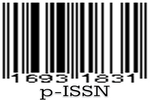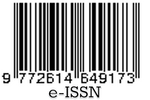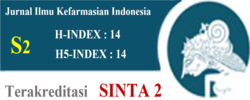The role of pharmacist counseling for patient with type 2 diabetes mellitus and its impact on blood glucose control and quality of life at RSUD Pasar Minggu
Abstract
Quality of life is an important aspect for patients with type 2 diabetes mellitus (T2DM). Pharmacist counseling is a non-pharmacological effort that can be provided to improve quality of life and control blood glucose levels. This study aimed to determine the effect of pharmacist-led therapeutic counseling for T2DM patients on improving their quality of life and reducing blood glucose levels. The study used a quasi-experimental nonequivalent control group design, with pretest and posttest assessments conducted before and after the intervention at RSUD Pasar Minggu, South Jakarta. A total of 194 T2DM patients participated in the study, with 97 patients in both the intervention and control groups. Quality of life was measured using the EQ-5D-5L and EQ-VAS questionnaires, along with fasting blood glucose levels. Measurements were taken three times: before the intervention, and one month and two months after the intervention. Paired data were analyzed using the Wilcoxon test, while unpaired data were analyzed using the Mann-Whitney test at a significance level of 0.05. Counseling significantly improved EQ-5D-5L scores (Δ=0.06; p<0.001) and EQ-VAS scores (Δ=6.40; p<0.001), as well as reduced fasting blood glucose levels (Δ=-12.10 mg/dL; p<0.001) in the intervention group after the intervention. The impact of counseling was particularly significant in the pain/discomfort and anxiety/depression domains. However, no significant correlation was found between quality of life and fasting blood glucose levels in this study (p>0.05). Pharmacist counseling conducted at RSUD Pasar Minggu had a positive and significant impact on improving the quality of life and treatment outcomes related to blood glucose reduction.
References
[2] Riset Kesehatan Dasar, Laporan Nasional Riskesdas 2018. Jakarta: Badan Penelitian dan Pengembangan Kesehatan Riset, 2018.
[3] D. Setyorini et al., “Peningkatan Kualitas Hidup Lanjut Usia (Lansia) di Kampung Penumping RW 03 dengan Latihan Fisik,” Jurnal Universitas Ahmad Dahlan, vol. 1, no. 1, pp. 1–5, 2020.
[4] World Health Organization, WHOQOL: Measuring Quality of Life. Geneva: World Health Organization, 1997.
[5] M. J. Davies et al., “Management of Hyperglycemia in Type 2 Diabetes, 2018. A Consensus Report by the American Diabetes Association (ADA) and the European Association for the Study of Diabetes (EASD).,” Diabetes Care, vol. 41, no. 12, pp. 2669–2701, 2018.
[6] L. Vinet and A. Zhedanov, “A ‘missing’ family of classical orthogonal polynomials,” J Phys A Math Theor, vol. 44, no. 8, p. 85201, 2011.
[7] R. P. Nugraha, “Kualitas Hidup Pasien Diabetes Melitus Tipe 2 Yang Mendapat Antidiabetika Oral Di Puskesmas Kaliwungu Kabupaten Kudus Dengan Menggunakan Kuesioner DQLCTQ,” in Skripsi, Semarang: Universitas Sultan Agung, 2021.
[8] H. E. Septiar and P. Utami, “Pengaruh Konseling Farmasis Terhadap Kualitas Hidup Dan Kadar Gula Darah Pada Pasien Diabetes Mellitus Tipe 2 di Puskesmas Gedong Tengen Periode Maret-Mei 2014,” Jurnal Farmasi Sains dan Praktis, vol. 1, no. 1, pp. 29–34, 2015.
[9] F. I. Pratiwi and A. Widayati, “Pengaruh Intervensi Tenaga Kesehatan terhadap Kepatuhan Minum Obat pada Pasien Diabetes Mellitus Tipe 2 di Indonesia: Kajian Literatur,” Jurnal Sains Farmasi & Klinis, vol. 8, no. 2, p. 107, 2021.
[10] S. B. Tondok, E. Watu, and W. Wahyuni, “Validitas instrumen European Qualitiy of Life (EQ-5D-5L) Versi Indonesia untuk menilai kualitas hidup penderita tuberkulosis,” EJurnal Malahayati, vol. 15, no. 2, pp. 267–273, 2021.
[11] D. Puspatari and S. Saidah, “Article Review: Effect of Counseling on Quality of Life in Type-2 Diabetes Mellitus Patients,” Medical Sains : Jurnal Ilmiah Kefarmasian, vol. 8, no. 3, pp. 1053–1066, 2023.
[12] S. Syarifuddin, A. Nasution, A. Dalimunthe, and Khairunnisa, “Impact of Pharmacist Intervention on Improving the Quality of Life of Patients with Type 2 Diabetes Mellitus.,” Macedonian journal of medical sciences, vol. 7, no. 8, pp. 1401–1405, 2019.
[13] W. M. Maw et al., “The effect of pharmaceutical care in the elderly patients with type 2 diabetes mellitus,” Asian J Pharm Sci, vol. 11, no. 1, pp. 93–94, 2016.
[14] W. P. Rahmat, “Pengaruh Konseling terhadap Kecemasan dan Kualitas Hidup Pasien Diabetes Melitus di Kecamatan Kebakkramat,” in Tesis, Surakarta: UNS, 2010.
[15] I. R. C. E. S. Caetano, L. M. Santiago, and M. Marques, “Impact of written information on control and adherence in type 2 diabetes.,” Rev Assoc Med Bras, vol. 64, no. 2, pp. 140–147, 2018.
[16] R. M. Sagala, W. Arozal, R. Sauriasari, and S. Keban, “Evaluasi Penerapan Booklet dan Edukasi Apoteker pada Pasien Diabetes Melitus Tipe 2 di Rumah Sakit Mayapada Tangerang,” Pharmaceutical Sciences and Research, vol. 4, no. 2, pp. 102–110, 2017.
[17] A. H. Khan, M. Z. Iqbal, S. A. Syed Sulaiman, A. Ibrahim, N. S. Binti Yusoff Azmi, and M. S. Iqbal, “Effect of pharmacist-led intervention on predictors of diabetic neuropathy at two different hospitals of Malaysia,” J Pharm Pharmacogn Res, vol. 9, no. 2, pp. 153–164, 2021.
[18] M. Butt, A. Mhd Ali, M. M. Bakry, and N. Mustafa, “Impact of a pharmacist led diabetes mellitus intervention on HbA1c, medication adherence and quality of life: A randomised controlled study,” Saudi Pharmaceutical Journal, vol. 24, no. 1, pp. 40–48, 2016.
[19] D. M. Scott, S. T. Boyd, M. Stephan, S. C. Augustine, and T. P. Reardon, “Outcomes of pharmacist-managed diabetes care services in a community health center,” American Journal of Health-System Pharmacy, vol. 63, no. 21, pp. 2116–2122, 2006.
[20] J. N. Lee, “The Effects of Pharmacist Intervention on Depression Medication Adherence: A Systematic Review,” in Thesis, Florida: University of Florida, 2006.
[21] R. Malathy, M. Narmadha, S. Ramesh, J. M. Alvin, and B. N. Dinesh, “Effect of a diabetes counseling programme on knowledge, attitude and practice among diabetic patients in Erode district of South India.,” J Young Pharm, vol. 3, no. 1, pp. 65–72, 2011.
[22] S. Pousinho, M. Morgado, A. Falcão, and G. Alves, “Pharmacist Interventions in the Management of Type 2 Diabetes Mellitus: A Systematic Review of Randomized Controlled Trials.,” J Manag Care Spec Pharm, vol. 22, no. 5, pp. 493–515, 2016.
[23] T. H. Nguyen et al., “A randomized controlled trial of a pharmacist-led intervention to enhance knowledge of Vietnamese patients with type 2 diabetes mellitus,” International Journal of Pharmacy Practice, vol. 30, no. 5, pp. 449–456, 2022.
[24] Fajriansyah, A. Iskandarsyah, I. M. Puspitasari, and K. Lestari, “Impact of pharmacist counseling on health-related quality of life of patients with type 2 diabetes mellitus: a cluster randomized controlled study.,” J Diabetes Metab Disord, vol. 19, no. 2, pp. 675–682, 2020.
[24] E. T. A. Setyani, D. Anggraini, R. A. Aulia, and A. W. Mukti, “Article Review : Peranan Apoteker Dalam Pelayanan Kefarmasian Pada Pasien Diabetes Melitus (DM),” Jurnal Sains Farmasi, vol. 4, no. 2, pp. 93–106, 2023.
[26] P. C. Lim et al., “The impact of pharmacist interventions, follow-up frequency and default on glycemic control in Diabetes Medication Therapy Adherence Clinic program: a multicenter study in Malaysia.,” J Pharm Policy Pract, vol. 16, no. 1, p. 83, 2023.

This work is licensed under a Creative Commons Attribution-NonCommercial-ShareAlike 4.0 International License.
Licencing
All articles in Jurnal Ilmu Kefarmasian Indonesia are an open-access article, distributed under the terms of the Creative Commons Attribution-NonCommercial-ShareAlike 4.0 International License which permits unrestricted non-commercial used, distribution and reproduction in any medium.
This licence applies to Author(s) and Public Reader means that the users mays :
- SHARE:
copy and redistribute the article in any medium or format - ADAPT:
remix, transform, and build upon the article (eg.: to produce a new research work and, possibly, a new publication) - ALIKE:
If you remix, transform, or build upon the article, you must distribute your contributions under the same license as the original. - NO ADDITIONAL RESTRICTIONS:
You may not apply legal terms or technological measures that legally restrict others from doing anything the license permits.
It does however mean that when you use it you must:
- ATTRIBUTION: You must give appropriate credit to both the Author(s) and the journal, provide a link to the license, and indicate if changes were made. You may do so in any reasonable manner, but not in any way that suggests the licensor endorses you or your use.
You may not:
- NONCOMMERCIAL: You may not use the article for commercial purposes.
This work is licensed under a Creative Commons Attribution-NonCommercial-ShareAlike 4.0 International License.





 Tools
Tools





















